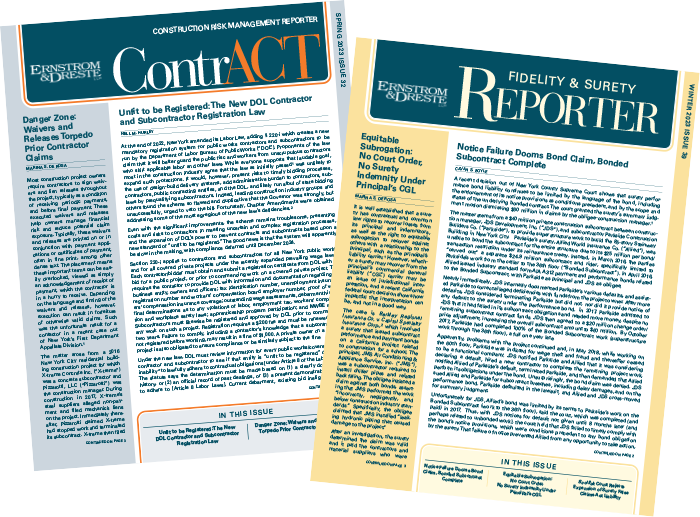Article by: Cavan S. Boyle
Benjamin Franklin is credited with saying, “Remember that time is money”. History may not include “builder” among Franklin’s many accomplishments, but he certainly would have understood why most modern construction contracts contain provisions that govern the parties’ entitlement to delay damages. Often, the contract also prescribes the manner in which an owner reviews and responds to those claims. But what happens when a contract does not state when, how, or even if, an owner must respond to a contractor’s properly submitted delay claims? According to a recent First Department decision in Tutor Perini Corp. v. City of New York,1 the answer is nothing, leaving that contractor in a tough spot.
The case involved a 2018 public construction project between Tutor Perini and the New York City Department of Transportation (the “City”)2 for the rehabilitation of the Broadway Bridge over the Harlem River.
The project was initially scheduled to finish in July 2021, but Tutor Perini claimed that significant owner-directed design changes pushed the likely substantial completion date to May 2027. As a result, Tutor Perini faced millions of dollars in delay-related costs that would continue to accrue over the project’s duration, and the prospect of the City asserting $7,000 per day in potential liquidated damages for late completion. Over the next one and a half years, Tutor Perini properly submitted notices of its delay and extension claims to the City, without receiving any response or determination. Frustrated with the City’s silence, Tutor Perini filed a declaratory judgment lawsuit asking the court to find the City obligated to “timely and reasonably address” its delay claims.
Tutor Perini made three main arguments. First, the contract’s notice of claim provisions were designed to require a response, particularly since the contract included a six-month contractual limitations period. Second, that failing to respond to the claims violated the covenant of good faith and fair dealing implied in every contract. Third, the City’s failure to respond violated the prevention doctrine by frustrating Tutor Perini’s ability to carry out its agreement.
The court disagreed and instead found that because there was no specific language that required the City to respond to Tutor Perini’s delay claims, the City had no such obligation. “Silence does not equate to contractual ambiguity,” the court said, and it refused to “write into a contact conditions the parties did not include.” The court noted, “[Tutor Perini] is not totally deprived of the benefit of the contract” because “no provision in the contract states that [it] must wait to file delay claims until after review or rejection of those claims,” leaving open the immediate opportunity for Tutor Perini to sue the City for breach of contract. Thus, the court rejected Tutor Perini’s arguments that the City’s lack of response had violated the implied covenant of good faith and fair dealing and the prevention doctrine.
The City asserted that it typically did not process contract claims, including delay claims, until after the project was substantially complete. While this flies in the face of the very purpose of the contract’s immediate notice provisions placed on Tutor Perini,3 that did not impact the court’s determination that no action whatsoever was required by the City in response to those notices.
Contractors that find themselves in this position face the difficult task of quantifying financial exposure and determining how (and maybe even whether) to proceed.4 In such circumstances, how long must the contractor wait before legal action would succeed? Might the owner then paradoxically argue that the lawsuit is premature because there has been no denial of the contractor’s claims or that damages are undeterminable? On the other hand, the owner’s non-responsiveness could implicate applicable limitations periods for suit if the owner’s conduct is later deemed a constructive denial.
With such high-stakes questions hanging in the balance, a contractor in this situation is best served by continuing to “document its claim” with ongoing written claim updates to the owner and seeking immediate counsel with experienced construction attorneys.
- 225 AD3d 439 (1st Dept 2024).
- The City acted on behalf of NYCDOT and was a named defendant.
- The logical purpose of such provisions is to provide the owner with prompt notice so that efficient owner investigation may be made, the validity of the claim determined, and steps taken to avoid or minimize the delay.
- Depending on the contract, the contractor may have the right to terminate the contract but then runs the risk of itself being held in breach if it turns out to be wrong.




